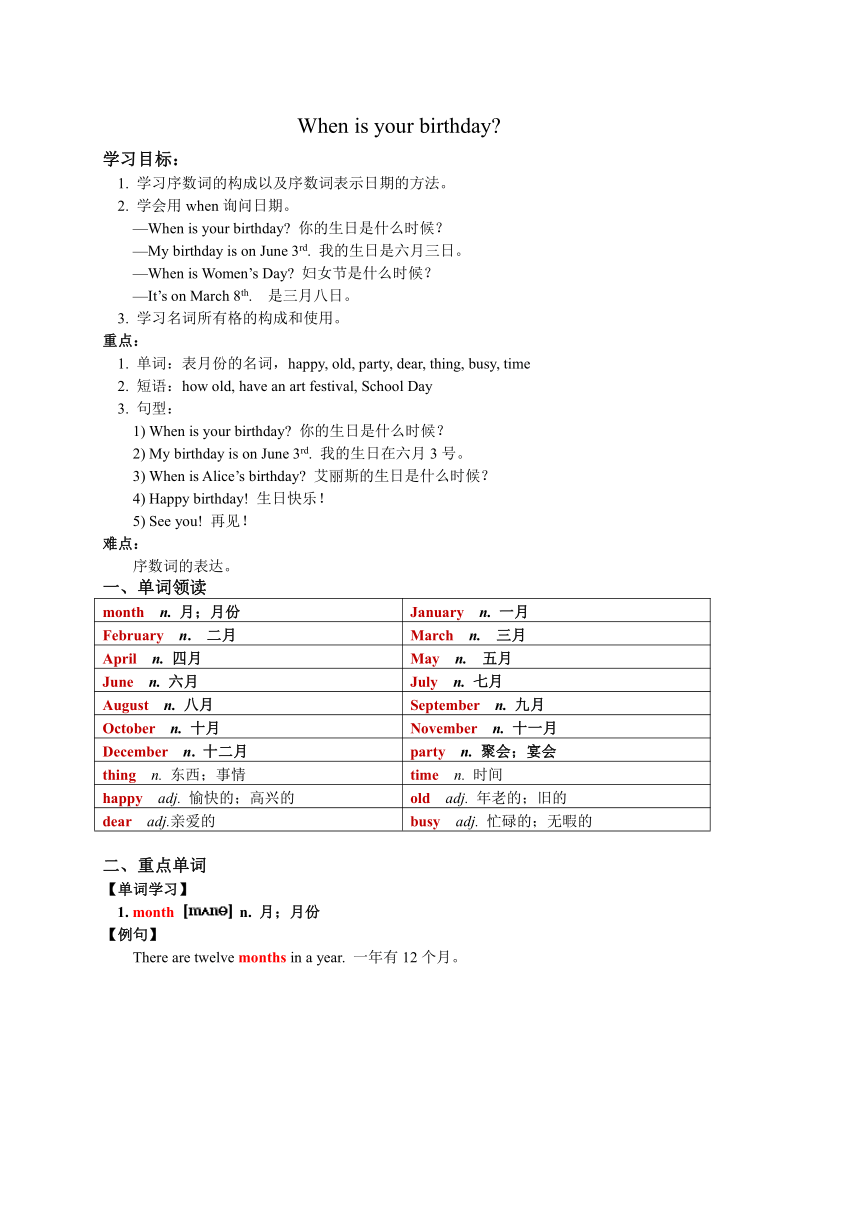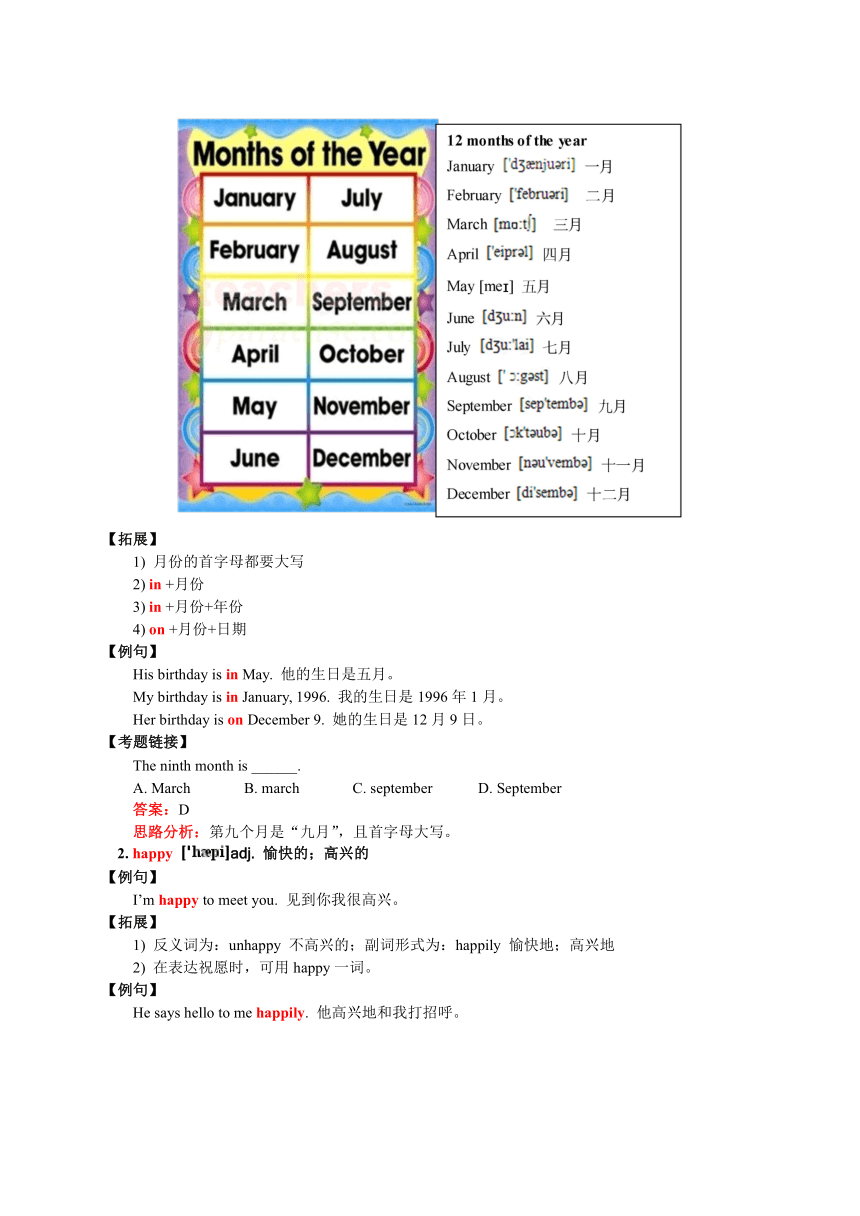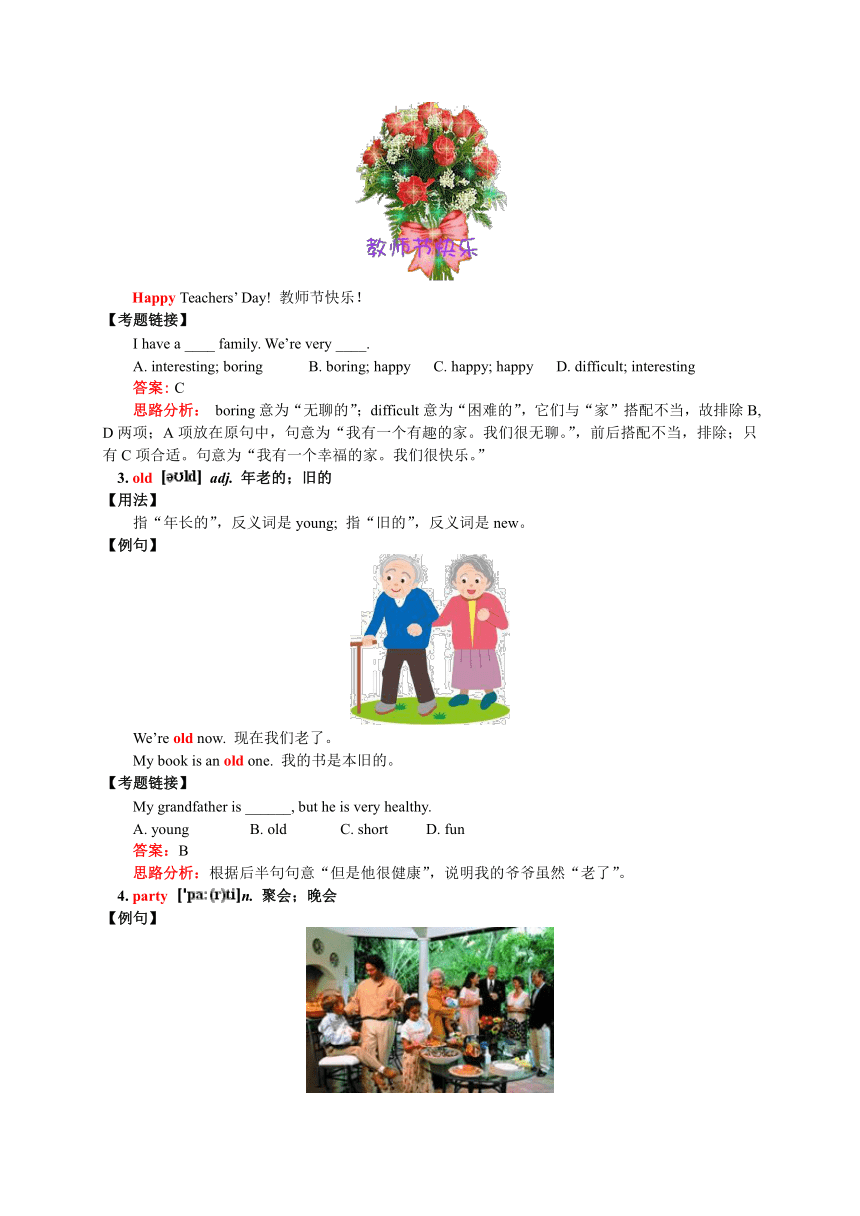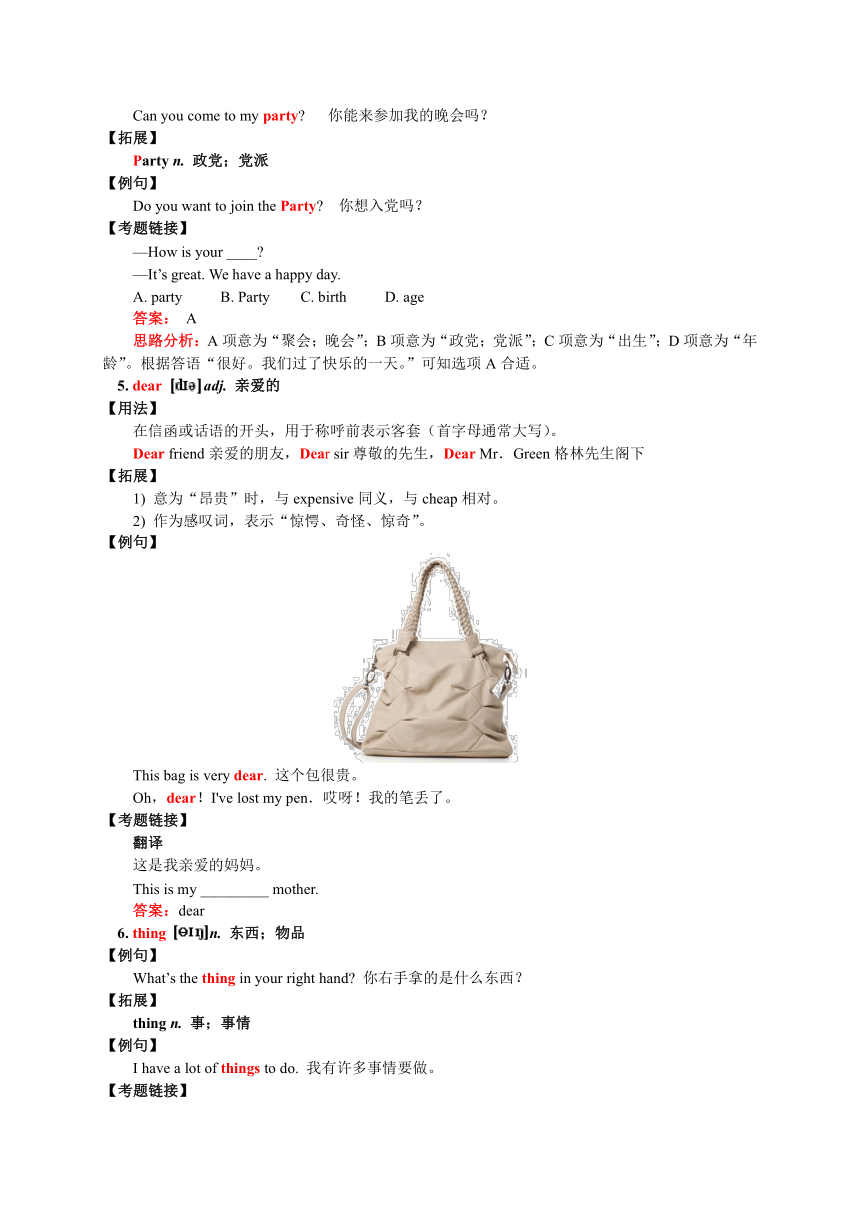Unit 1 When is your birthday? 学案
文档属性
| 名称 | Unit 1 When is your birthday? 学案 |

|
|
| 格式 | doc | ||
| 文件大小 | 1.8MB | ||
| 资源类型 | 教案 | ||
| 版本资源 | 鲁教版 | ||
| 科目 | 英语 | ||
| 更新时间 | 2019-03-31 22:29:02 | ||
图片预览





文档简介
When is your birthday
学习目标:
1. 学习序数词的构成以及序数词表示日期的方法。
2. 学会用when询问日期。
—When is your birthday 你的生日是什么时候?
—My birthday is on June 3rd. 我的生日是六月三日。
—When is Women’s Day 妇女节是什么时候?
—It’s on March 8th. 是三月八日。
3. 学习名词所有格的构成和使用。
重点:
1. 单词:表月份的名词,happy, old, party, dear, thing, busy, time
2. 短语:how old, have an art festival, School Day
3. 句型:
1) When is your birthday 你的生日是什么时候?
2) My birthday is on June 3rd. 我的生日在六月3号。
3) When is Alice’s birthday 艾丽斯的生日是什么时候?
4) Happy birthday! 生日快乐!
5) See you! 再见!
难点:
序数词的表达。
一、单词领读
month n. 月;月份 January n. 一月
February n. 二月 March n. 三月
April n. 四月 May n. 五月
June n. 六月 July n. 七月
August n. 八月 September n. 九月
October n. 十月 November n. 十一月
December n. 十二月 party n. 聚会;宴会
thing n. 东西;事情 time n. 时间
happy adj. 愉快的;高兴的 old adj. 年老的;旧的
dear adj.亲爱的 busy adj. 忙碌的;无暇的
二、重点单词
【单词学习】
1. month n. 月;月份
【例句】
There are twelve months in a year. 一年有12个月。
【拓展】
1) 月份的首字母都要大写
2) in +月份
3) in +月份+年份
4) on +月份+日期
【例句】
His birthday is in May. 他的生日是五月。
My birthday is in January, 1996. 我的生日是1996年1月。
Her birthday is on December 9. 她的生日是12月9日。
【考题链接】
The ninth month is ______.
A. March B. march C. september D. September
答案:D
思路分析:第九个月是“九月”,且首字母大写。
2. happy adj. 愉快的;高兴的
【例句】
I’m happy to meet you. 见到你我很高兴。
【拓展】
1) 反义词为:unhappy 不高兴的;副词形式为:happily 愉快地;高兴地
2) 在表达祝愿时,可用happy一词。
【例句】
He says hello to me happily. 他高兴地和我打招呼。
Happy Teachers’ Day! 教师节快乐!
【考题链接】
I have a ____ family. We’re very ____.
A. interesting; boring B. boring; happy C. happy; happy D. difficult; interesting
答案: C
思路分析: boring意为“无聊的”;difficult意为“困难的”,它们与“家”搭配不当,故排除B, D两项;A项放在原句中,句意为“我有一个有趣的家。我们很无聊。”,前后搭配不当,排除;只有C项合适。句意为“我有一个幸福的家。我们很快乐。”
3. old adj. 年老的;旧的
【用法】
指“年长的”,反义词是young; 指“旧的”,反义词是new。
【例句】
We’re old now. 现在我们老了。
My book is an old one. 我的书是本旧的。
【考题链接】
My grandfather is ______, but he is very healthy.
A. young B. old C. short D. fun
答案:B
思路分析:根据后半句句意“但是他很健康”,说明我的爷爷虽然“老了”。
4. party n. 聚会;晚会
【例句】
Can you come to my party 你能来参加我的晚会吗?
【拓展】
Party n. 政党;党派
【例句】
Do you want to join the Party 你想入党吗?
【考题链接】
—How is your ____
—It’s great. We have a happy day.
A. party B. Party C. birth D. age
答案: A
思路分析:A项意为“聚会;晚会”;B项意为“政党;党派”;C项意为“出生”;D项意为“年龄”。根据答语“很好。我们过了快乐的一天。”可知选项A合适。
5. dear adj. 亲爱的
【用法】
在信函或话语的开头,用于称呼前表示客套(首字母通常大写)。
Dear friend亲爱的朋友,Dear sir尊敬的先生,Dear Mr.Green格林先生阁下
【拓展】
1) 意为“昂贵”时,与expensive同义,与cheap相对。
2) 作为感叹词,表示“惊愕、奇怪、惊奇”。
【例句】
This bag is very dear. 这个包很贵。
Oh,dear!I've lost my pen.哎呀!我的笔丢了。
【考题链接】
翻译
这是我亲爱的妈妈。
This is my _________ mother.
答案:dear
6. thing n. 东西;物品
【例句】
What’s the thing in your right hand 你右手拿的是什么东西?
【拓展】
thing n. 事;事情
【例句】
I have a lot of things to do. 我有许多事情要做。
【考题链接】
Do you know the ____
A. what B. how C. good D. thing
答案:D
思路分析:the是冠词,其后应接名词。A, B两项是疑问词,C项是形容词,均排除;D项是名词。句意为“你了解这种东西吗?”
7. busy adj. 忙碌的;无暇的
【用法】
1) 作定语和表语
2) be busy doing sth. = be busy with sth. 忙于做某事
【例句】
He is a busy man. 他是一个忙碌的人。
I’m busy writing to my mother. 我正忙着给妈妈写信。
He is busy with his homework.= He is busy doing his homework. 他正忙于做作业。
【拓展】
1) 充满活动的;热闹的
2) (尤指电话线) 正被占用的,不通的
【例句】
Yesterday I had a busy afternoon. 昨天下午我很忙。
Sorry, her phone is busy. 抱歉,她的电话正在使用中。
【考题链接】
He can’t come to the party because he is very ____.
A. happy B. funny C. busy D. strict
答案:C
思路分析:A项意为“快乐的”;B项意为“有趣的”;C项意为“繁忙的”;D项意为“严格的”;把各选项放到句中,他不能来参加聚会的原因只能因为“他很忙”。
8. time n. 时间
【用法】
常作不可数名词。
【例句】
I have only a little time. 我只有一点时间了。
【拓展】
1) It’s time for sth. 到了(做)某事的时间了。
2) It’s time (for sb.) to do sth. 到了(某人)做某事的时间了。
3) have a good time 玩得高兴;过得快乐,相当于have fun。
【例句】
It’s time for class. 到上课的时间了。
It’s time to have lunch. 到了吃午饭的时间了。
We have a good time there. 在那儿我们玩得很快乐。
【考题链接】
—____ do you have a party
—At 6:00 on Sunday evening.
A. What time B. Where C. Why D. Who
答案:A
思路分析:根据答语“在星期天晚上6点钟”可知表示具体时间,故用what time提问,相当于when。排除B, C, D三项。
【即学即练】
根据句意、首字母及汉语提示写出所缺单词
1. The third ________(月份) is March.
2. H _________ May Day!
3. How o________ is your brother
4. This evening we have a birthday _________(聚会) for Jim.
5. Lucy, this is my ________(亲爱的) mother.
6. These t_________ are mine.
7. He is always b________.
8. It’s _________(时间) to have lunch.
答案:1. month 2. Happy 3. old 4. party 5. dear 6. things 7. busy 8. time
三、重点短语
【短语学习】
☆☆1. how old 多大年纪;多少岁
【用法】
询问年龄。答语常为:
主语+ am/is/are +数词(+years old).
其中,years old也可省略,直接回答年龄。
注意:在西方国家,人们大多忌讳别人了解自己的年龄,尤其是成年女性,她们认为年龄是个人隐私,询问他人年龄是不礼貌的。
【例句】
—How old is Jane’s brother 简的弟弟几岁了?
—He is eight (years old). 他八岁了。
【拓展】
How old is/ are +人称代词?=What’s one’s age
【例句】
How old are you =What’s your age 你多大了?
【考题链接】
1. —_____ is your friend
—He’s fourteen.
A. How old B. How C. How age D. What age
答案:A
思路分析:根据答语“他十四岁”可知问句询问年龄,故用how old。
2. —How old are you, Mrs. Li
—_______.
A. I am a doctor B. Ah, it’s a secret C. I’m 15 years old D. Thirteen
答案:B
思路分析:根据Mrs. Li可知是成年女性,问其年龄是忌讳的事,故答语用“这是一个秘密”。
2. have an art festival 举行艺术节
【用法】
have意为“举行;举办”。可构成“have +a/an +名词”短语:
have a School Day 举行学校庆祝日
have a birthday party 举行生日聚会
have a school trip 举办学校旅行
have a volleyball game 举行排球比赛
【考题链接】
翻译
你们的艺术节是什么时候?
When is your ______ ______
答案:art festival
☆3. School Day 校庆日
【用法】
day n. 节日
【例句】
New Year’s Day is on January 1st. 新年在元月一日。
【拓展】
1) 天
2) 用作复数时,意为“时代;时期”。
【例句】
Every day he plays sports. 他每天都进行运动。
In the old days, people didn’t have a TV. 在古代,人们没有电视。
【辨析】
day, date
date (1)指“日期”,即“某年某月某日”,一般用单数。(2)提问时,date指“几月几日”。 —What’s the date today 今天几号?—It’s March 3rd. 三月三号。
day (1)泛指“日子”,可以指24小时的一整天,也可以单指白天。(2)提问时,day指的是“星期几”。 —What day is it today 今天星期几?—It’s Thursday. 星期四。
【考题链接】
— What’s the ____ of her birth
—It’s June eighth.
A. date B. day C. birthday D. month
答案:A
思路分析:A项意为“日期”;B项意为“日子”;C项意为“生日”;D项意为“月”。根据答语“六月八日”可知询问“日期”,故排除B, C, D三项。
【即学即练】
1. What’s your age (同义句转换)
_______ ________ are you
答案:How old
2. It’s Sunday today. (对划线部分提问)
_______ _______ is it today
答案:What day
3. We have _______ ________ ________(艺术节) in the afternoon.
答案:an art festival
四、重点句型
【句型学习】
1. When is your birthday 你的生日是什么时候?
【句析】
本句是由特殊疑问词when引导的特殊疑问句。
【用法】
when 疑问副词,意为“什么时候,何时”,可以对“日期”,“月份”,“钟点”等时间进行提问。
【例句】
—When do you go to school 你什么时候去上学?
—I go to school at 8 in the morning. 我在早晨8点去上学。
【辨析】
What time…一般用于对具体时间的提问
【例句】
—What time is it now 现在几点了?
—It’s three. 三点了。
【考题链接】
—____ do they play basketball
— Every afternoon.
A. What B. How C. Where D. When
答案:D
思路分析:根据答语“每天下午”可知询问时间,故用when提问。
2. My birthday is on June 3rd. 我的生日在六月3号。
【用法1】
on 介词,一般用于某一天和特定某天的上午、下午或晚上:
on Sunday 在周日;
on January 8th 在一月八日;
on the morning of June 20th在六月二十日的早上;
on the evening of Saturday 在周六的晚上;
on a cold winter morning 在一个寒冷冬日的早上
【拓展】
1) in 一般用于在某一年、某个季节或某个月;或泛指在上午、在下午或在晚上。
in 1998 在1998年;
in summer 在夏天;
in March 在三月;
in the morning 在早上
2) at 一般用于时刻、年龄前。
at seven o’clock 在七点钟;
at half past nine 在九点半;
at six 在六岁时
【考题链接】
We’ll hold a party in celebration of the 90th birthday of the CPC(中国共产党)______ Friday.
A. in B. on C. at D. from
答案:B
思路分析:在特定的某一天用介词on。
【用法2】
3rd即:third,是序数词,表示顺序的词是序数词。
其前常用定冠词the。序数词一般由与之相应的基数词词尾加-th构成。但以下基数词变为序数词时,有特别之处:
1) one → first; two→ second; three→ third; five→ fifth; nine→ ninth; twelve→ twelfth
2) 以ty结尾的基数词,要先变y为i,再加-eth。
twenty → twentieth; thirty → thirtieth; forty→ fortieth; fifty → fiftieth; sixty → sixtieth;
seventy → seventieth; eighty → eightieth; ninety → ninetieth
3) 表示“第几十几”时,只变个位数为序数词。
twenty-one → twenty- first; fifty- five → fifty- fifth; ninety- nine → ninety-ninth
【考题链接】
My birthday is on January _____, 1992.
A. 12th B. 12fth C. 12s D. 1th
答案:A
思路分析:序数词的缩写是在相应的阿拉伯数字后加上英文写法的最后两个字母。twelfth可写为12th,而first则为1st。
3. When is Alice’s birthday 艾丽斯的生日是什么时候?
【用法】
Alice’s 是“名词+’s,”是名词所有格的一种形式。
有生命物体的名词以及表示时间、距离、国家、城市等的名词常用“’s 所有格。”
“’s所有格”的变化规则:
1) 单数名词后直接加’s。
2)复数名词有s时,其后只加’。
3) 表示“共有”时,只在最后一个名词上加 ’s。
4) 表示“各自所有”时,在各名词后加 ’s。
5) 表店铺、住家、公共建筑物、办公室等的名词,其所有格后常省略名词。
【例句】
This is my son’s book. 这是我儿子的书。
These are students’ schoolbags. 这些是学生们的书包。
It’s twenty minutes’ walk. 步行二十分钟的路程。
This is Lucy and Lily’s mother. 这是露西和莉莉的妈妈。
These are Xiao Hong’s and Xiao Ling’s rulers. 这些是小红和小玲的尺子。
We’re at my uncle’s. 我们在我叔叔家。
【考题链接】
____ room is big and bright. They like it very much.
A. Linda and Anna B. Linda’s and Anna
C. Linda and Anna’s D. Linda’s and Anna’s
答案:C
思路分析:根据题中room用的是单数形式,可知房间是这两人共有的。当两人共有某物时,其名词所有格应在后面的那个人名后加’s。故选C项。
4. Happy birthday! 生日快乐!
【句析】
用来对他人的生日进行祝福。
表达“祝某人生日快乐”时可加介词to…。
答语常用:Thank you.
【例句】
—Happy birthday to you! 祝你生日快乐!
—Thank you. 谢谢。
【考题链接】
—Happy birthday to you!
—_______.
A. You are good B. Great C. You are right D. Thanks
答案:D
思路分析:回答别人祝福生日的话语时常用“Thank you”,也可用“Thanks”。
5. See you! 再见!
【句析】
本句用于告别的场合。See you! = Good-bye! 再见!
【拓展】
See you soon! 回头见。此句用于暂时分别的场合。
See you again. 用于事先没有预约好的场合。
See you later. 用于事先预约好的场合。
See you then. 到时候见。事先约好。
【考题链接】
—See you.
—________.
A. Have a good time B. Have a good day
C. See you D. Come on
答案:C
思路分析:A项和B项都是祝愿的话语,意为“祝你过得愉快”;D项是催促别人快走,意为“快点”;题干句意为“再见”,故答语选C项。
【即学即练】
Ⅰ. 写出下列单词的序数词
1. one __________ 2. two __________ 3. three ___________ 4. five __________
5. eight _________ 6. nine _________ 7. twelve __________ 8. thirteen ________
9. twenty _________ 10. thirty- seven _____________
答案:1. first 2. second 3. third 4. fifth 5. eighth 6. ninth 7. twelfth 8. thirteenth 9. twentieth 10. thirty- seventh
Ⅱ. 用名词所有格填空
1. The boy is _______ (Tina) brother.
2. September tenth is _______ (teacher) Day.
3. This is _______(Jeff and John) bedroom.
4. _______(Vera and Emma) erasers are new.
5. It’s about five ________(hour) walk.
答案:1. Tina’s 2. Teachers’ 3. Jeff and John’s 4. Vera’s and Emma’s 5. hours’
学习目标:
1. 学习序数词的构成以及序数词表示日期的方法。
2. 学会用when询问日期。
—When is your birthday 你的生日是什么时候?
—My birthday is on June 3rd. 我的生日是六月三日。
—When is Women’s Day 妇女节是什么时候?
—It’s on March 8th. 是三月八日。
3. 学习名词所有格的构成和使用。
重点:
1. 单词:表月份的名词,happy, old, party, dear, thing, busy, time
2. 短语:how old, have an art festival, School Day
3. 句型:
1) When is your birthday 你的生日是什么时候?
2) My birthday is on June 3rd. 我的生日在六月3号。
3) When is Alice’s birthday 艾丽斯的生日是什么时候?
4) Happy birthday! 生日快乐!
5) See you! 再见!
难点:
序数词的表达。
一、单词领读
month n. 月;月份 January n. 一月
February n. 二月 March n. 三月
April n. 四月 May n. 五月
June n. 六月 July n. 七月
August n. 八月 September n. 九月
October n. 十月 November n. 十一月
December n. 十二月 party n. 聚会;宴会
thing n. 东西;事情 time n. 时间
happy adj. 愉快的;高兴的 old adj. 年老的;旧的
dear adj.亲爱的 busy adj. 忙碌的;无暇的
二、重点单词
【单词学习】
1. month n. 月;月份
【例句】
There are twelve months in a year. 一年有12个月。
【拓展】
1) 月份的首字母都要大写
2) in +月份
3) in +月份+年份
4) on +月份+日期
【例句】
His birthday is in May. 他的生日是五月。
My birthday is in January, 1996. 我的生日是1996年1月。
Her birthday is on December 9. 她的生日是12月9日。
【考题链接】
The ninth month is ______.
A. March B. march C. september D. September
答案:D
思路分析:第九个月是“九月”,且首字母大写。
2. happy adj. 愉快的;高兴的
【例句】
I’m happy to meet you. 见到你我很高兴。
【拓展】
1) 反义词为:unhappy 不高兴的;副词形式为:happily 愉快地;高兴地
2) 在表达祝愿时,可用happy一词。
【例句】
He says hello to me happily. 他高兴地和我打招呼。
Happy Teachers’ Day! 教师节快乐!
【考题链接】
I have a ____ family. We’re very ____.
A. interesting; boring B. boring; happy C. happy; happy D. difficult; interesting
答案: C
思路分析: boring意为“无聊的”;difficult意为“困难的”,它们与“家”搭配不当,故排除B, D两项;A项放在原句中,句意为“我有一个有趣的家。我们很无聊。”,前后搭配不当,排除;只有C项合适。句意为“我有一个幸福的家。我们很快乐。”
3. old adj. 年老的;旧的
【用法】
指“年长的”,反义词是young; 指“旧的”,反义词是new。
【例句】
We’re old now. 现在我们老了。
My book is an old one. 我的书是本旧的。
【考题链接】
My grandfather is ______, but he is very healthy.
A. young B. old C. short D. fun
答案:B
思路分析:根据后半句句意“但是他很健康”,说明我的爷爷虽然“老了”。
4. party n. 聚会;晚会
【例句】
Can you come to my party 你能来参加我的晚会吗?
【拓展】
Party n. 政党;党派
【例句】
Do you want to join the Party 你想入党吗?
【考题链接】
—How is your ____
—It’s great. We have a happy day.
A. party B. Party C. birth D. age
答案: A
思路分析:A项意为“聚会;晚会”;B项意为“政党;党派”;C项意为“出生”;D项意为“年龄”。根据答语“很好。我们过了快乐的一天。”可知选项A合适。
5. dear adj. 亲爱的
【用法】
在信函或话语的开头,用于称呼前表示客套(首字母通常大写)。
Dear friend亲爱的朋友,Dear sir尊敬的先生,Dear Mr.Green格林先生阁下
【拓展】
1) 意为“昂贵”时,与expensive同义,与cheap相对。
2) 作为感叹词,表示“惊愕、奇怪、惊奇”。
【例句】
This bag is very dear. 这个包很贵。
Oh,dear!I've lost my pen.哎呀!我的笔丢了。
【考题链接】
翻译
这是我亲爱的妈妈。
This is my _________ mother.
答案:dear
6. thing n. 东西;物品
【例句】
What’s the thing in your right hand 你右手拿的是什么东西?
【拓展】
thing n. 事;事情
【例句】
I have a lot of things to do. 我有许多事情要做。
【考题链接】
Do you know the ____
A. what B. how C. good D. thing
答案:D
思路分析:the是冠词,其后应接名词。A, B两项是疑问词,C项是形容词,均排除;D项是名词。句意为“你了解这种东西吗?”
7. busy adj. 忙碌的;无暇的
【用法】
1) 作定语和表语
2) be busy doing sth. = be busy with sth. 忙于做某事
【例句】
He is a busy man. 他是一个忙碌的人。
I’m busy writing to my mother. 我正忙着给妈妈写信。
He is busy with his homework.= He is busy doing his homework. 他正忙于做作业。
【拓展】
1) 充满活动的;热闹的
2) (尤指电话线) 正被占用的,不通的
【例句】
Yesterday I had a busy afternoon. 昨天下午我很忙。
Sorry, her phone is busy. 抱歉,她的电话正在使用中。
【考题链接】
He can’t come to the party because he is very ____.
A. happy B. funny C. busy D. strict
答案:C
思路分析:A项意为“快乐的”;B项意为“有趣的”;C项意为“繁忙的”;D项意为“严格的”;把各选项放到句中,他不能来参加聚会的原因只能因为“他很忙”。
8. time n. 时间
【用法】
常作不可数名词。
【例句】
I have only a little time. 我只有一点时间了。
【拓展】
1) It’s time for sth. 到了(做)某事的时间了。
2) It’s time (for sb.) to do sth. 到了(某人)做某事的时间了。
3) have a good time 玩得高兴;过得快乐,相当于have fun。
【例句】
It’s time for class. 到上课的时间了。
It’s time to have lunch. 到了吃午饭的时间了。
We have a good time there. 在那儿我们玩得很快乐。
【考题链接】
—____ do you have a party
—At 6:00 on Sunday evening.
A. What time B. Where C. Why D. Who
答案:A
思路分析:根据答语“在星期天晚上6点钟”可知表示具体时间,故用what time提问,相当于when。排除B, C, D三项。
【即学即练】
根据句意、首字母及汉语提示写出所缺单词
1. The third ________(月份) is March.
2. H _________ May Day!
3. How o________ is your brother
4. This evening we have a birthday _________(聚会) for Jim.
5. Lucy, this is my ________(亲爱的) mother.
6. These t_________ are mine.
7. He is always b________.
8. It’s _________(时间) to have lunch.
答案:1. month 2. Happy 3. old 4. party 5. dear 6. things 7. busy 8. time
三、重点短语
【短语学习】
☆☆1. how old 多大年纪;多少岁
【用法】
询问年龄。答语常为:
主语+ am/is/are +数词(+years old).
其中,years old也可省略,直接回答年龄。
注意:在西方国家,人们大多忌讳别人了解自己的年龄,尤其是成年女性,她们认为年龄是个人隐私,询问他人年龄是不礼貌的。
【例句】
—How old is Jane’s brother 简的弟弟几岁了?
—He is eight (years old). 他八岁了。
【拓展】
How old is/ are +人称代词?=What’s one’s age
【例句】
How old are you =What’s your age 你多大了?
【考题链接】
1. —_____ is your friend
—He’s fourteen.
A. How old B. How C. How age D. What age
答案:A
思路分析:根据答语“他十四岁”可知问句询问年龄,故用how old。
2. —How old are you, Mrs. Li
—_______.
A. I am a doctor B. Ah, it’s a secret C. I’m 15 years old D. Thirteen
答案:B
思路分析:根据Mrs. Li可知是成年女性,问其年龄是忌讳的事,故答语用“这是一个秘密”。
2. have an art festival 举行艺术节
【用法】
have意为“举行;举办”。可构成“have +a/an +名词”短语:
have a School Day 举行学校庆祝日
have a birthday party 举行生日聚会
have a school trip 举办学校旅行
have a volleyball game 举行排球比赛
【考题链接】
翻译
你们的艺术节是什么时候?
When is your ______ ______
答案:art festival
☆3. School Day 校庆日
【用法】
day n. 节日
【例句】
New Year’s Day is on January 1st. 新年在元月一日。
【拓展】
1) 天
2) 用作复数时,意为“时代;时期”。
【例句】
Every day he plays sports. 他每天都进行运动。
In the old days, people didn’t have a TV. 在古代,人们没有电视。
【辨析】
day, date
date (1)指“日期”,即“某年某月某日”,一般用单数。(2)提问时,date指“几月几日”。 —What’s the date today 今天几号?—It’s March 3rd. 三月三号。
day (1)泛指“日子”,可以指24小时的一整天,也可以单指白天。(2)提问时,day指的是“星期几”。 —What day is it today 今天星期几?—It’s Thursday. 星期四。
【考题链接】
— What’s the ____ of her birth
—It’s June eighth.
A. date B. day C. birthday D. month
答案:A
思路分析:A项意为“日期”;B项意为“日子”;C项意为“生日”;D项意为“月”。根据答语“六月八日”可知询问“日期”,故排除B, C, D三项。
【即学即练】
1. What’s your age (同义句转换)
_______ ________ are you
答案:How old
2. It’s Sunday today. (对划线部分提问)
_______ _______ is it today
答案:What day
3. We have _______ ________ ________(艺术节) in the afternoon.
答案:an art festival
四、重点句型
【句型学习】
1. When is your birthday 你的生日是什么时候?
【句析】
本句是由特殊疑问词when引导的特殊疑问句。
【用法】
when 疑问副词,意为“什么时候,何时”,可以对“日期”,“月份”,“钟点”等时间进行提问。
【例句】
—When do you go to school 你什么时候去上学?
—I go to school at 8 in the morning. 我在早晨8点去上学。
【辨析】
What time…一般用于对具体时间的提问
【例句】
—What time is it now 现在几点了?
—It’s three. 三点了。
【考题链接】
—____ do they play basketball
— Every afternoon.
A. What B. How C. Where D. When
答案:D
思路分析:根据答语“每天下午”可知询问时间,故用when提问。
2. My birthday is on June 3rd. 我的生日在六月3号。
【用法1】
on 介词,一般用于某一天和特定某天的上午、下午或晚上:
on Sunday 在周日;
on January 8th 在一月八日;
on the morning of June 20th在六月二十日的早上;
on the evening of Saturday 在周六的晚上;
on a cold winter morning 在一个寒冷冬日的早上
【拓展】
1) in 一般用于在某一年、某个季节或某个月;或泛指在上午、在下午或在晚上。
in 1998 在1998年;
in summer 在夏天;
in March 在三月;
in the morning 在早上
2) at 一般用于时刻、年龄前。
at seven o’clock 在七点钟;
at half past nine 在九点半;
at six 在六岁时
【考题链接】
We’ll hold a party in celebration of the 90th birthday of the CPC(中国共产党)______ Friday.
A. in B. on C. at D. from
答案:B
思路分析:在特定的某一天用介词on。
【用法2】
3rd即:third,是序数词,表示顺序的词是序数词。
其前常用定冠词the。序数词一般由与之相应的基数词词尾加-th构成。但以下基数词变为序数词时,有特别之处:
1) one → first; two→ second; three→ third; five→ fifth; nine→ ninth; twelve→ twelfth
2) 以ty结尾的基数词,要先变y为i,再加-eth。
twenty → twentieth; thirty → thirtieth; forty→ fortieth; fifty → fiftieth; sixty → sixtieth;
seventy → seventieth; eighty → eightieth; ninety → ninetieth
3) 表示“第几十几”时,只变个位数为序数词。
twenty-one → twenty- first; fifty- five → fifty- fifth; ninety- nine → ninety-ninth
【考题链接】
My birthday is on January _____, 1992.
A. 12th B. 12fth C. 12s D. 1th
答案:A
思路分析:序数词的缩写是在相应的阿拉伯数字后加上英文写法的最后两个字母。twelfth可写为12th,而first则为1st。
3. When is Alice’s birthday 艾丽斯的生日是什么时候?
【用法】
Alice’s 是“名词+’s,”是名词所有格的一种形式。
有生命物体的名词以及表示时间、距离、国家、城市等的名词常用“’s 所有格。”
“’s所有格”的变化规则:
1) 单数名词后直接加’s。
2)复数名词有s时,其后只加’。
3) 表示“共有”时,只在最后一个名词上加 ’s。
4) 表示“各自所有”时,在各名词后加 ’s。
5) 表店铺、住家、公共建筑物、办公室等的名词,其所有格后常省略名词。
【例句】
This is my son’s book. 这是我儿子的书。
These are students’ schoolbags. 这些是学生们的书包。
It’s twenty minutes’ walk. 步行二十分钟的路程。
This is Lucy and Lily’s mother. 这是露西和莉莉的妈妈。
These are Xiao Hong’s and Xiao Ling’s rulers. 这些是小红和小玲的尺子。
We’re at my uncle’s. 我们在我叔叔家。
【考题链接】
____ room is big and bright. They like it very much.
A. Linda and Anna B. Linda’s and Anna
C. Linda and Anna’s D. Linda’s and Anna’s
答案:C
思路分析:根据题中room用的是单数形式,可知房间是这两人共有的。当两人共有某物时,其名词所有格应在后面的那个人名后加’s。故选C项。
4. Happy birthday! 生日快乐!
【句析】
用来对他人的生日进行祝福。
表达“祝某人生日快乐”时可加介词to…。
答语常用:Thank you.
【例句】
—Happy birthday to you! 祝你生日快乐!
—Thank you. 谢谢。
【考题链接】
—Happy birthday to you!
—_______.
A. You are good B. Great C. You are right D. Thanks
答案:D
思路分析:回答别人祝福生日的话语时常用“Thank you”,也可用“Thanks”。
5. See you! 再见!
【句析】
本句用于告别的场合。See you! = Good-bye! 再见!
【拓展】
See you soon! 回头见。此句用于暂时分别的场合。
See you again. 用于事先没有预约好的场合。
See you later. 用于事先预约好的场合。
See you then. 到时候见。事先约好。
【考题链接】
—See you.
—________.
A. Have a good time B. Have a good day
C. See you D. Come on
答案:C
思路分析:A项和B项都是祝愿的话语,意为“祝你过得愉快”;D项是催促别人快走,意为“快点”;题干句意为“再见”,故答语选C项。
【即学即练】
Ⅰ. 写出下列单词的序数词
1. one __________ 2. two __________ 3. three ___________ 4. five __________
5. eight _________ 6. nine _________ 7. twelve __________ 8. thirteen ________
9. twenty _________ 10. thirty- seven _____________
答案:1. first 2. second 3. third 4. fifth 5. eighth 6. ninth 7. twelfth 8. thirteenth 9. twentieth 10. thirty- seventh
Ⅱ. 用名词所有格填空
1. The boy is _______ (Tina) brother.
2. September tenth is _______ (teacher) Day.
3. This is _______(Jeff and John) bedroom.
4. _______(Vera and Emma) erasers are new.
5. It’s about five ________(hour) walk.
答案:1. Tina’s 2. Teachers’ 3. Jeff and John’s 4. Vera’s and Emma’s 5. hours’
同课章节目录
- Unit 1 When is your birthday?
- Section A
- Section B
- Unit 2 My favourite subject is science
- Section A
- Section B
- Unit 3 Can you play the guitar?
- Section A
- Section B
- Unit 4 What time do you go to school?
- Section A
- Section B
- Unit 5 How do you get to school?
- Section A
- Section B
- Unit 6 Don't eat in class.
- Section A
- Section B
- Unit 7 Why do you like pandas?
- Section A
- Section B
- Unit 8 I'm watching TV.
- Section A
- Section B
- Unit 9 It's raining!
- Section A
- Section B
- Unit 10 Is there a post office near here?
- Section A
- Section B
